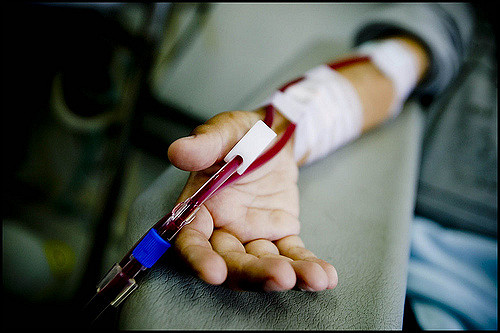Multiple myeloma is a form of cancer that affects plasma cells, a type of white blood cell commonly found in bone marrow. The cancerous plasma cells can create a tumor called a plasmacytoma. Multiple myeloma has many harmful symptoms. Patients with the cancer can have low blood counts, caused by the overgrowth of plasma cells crowding out healthy blood-forming cells, and the cancer cells also release signals which cause the break down of bones. Additionally, antibodies made by the cancerous plasma cells harm the kidneys, which can result in kidney damage or even kidney failure. In the United States, the risk of developing multiple myeloma is 1 in 143. The American Cancer Society estimates that by the end of 2015, there will be 26,850 new cases and 11,240 deaths due to multiple myeloma.
Image Source: UCSF
In 90% of multiple myeloma cases, the cancer doesn’t present an obvious genetic mutation that can be targeted during treatment, making it particularly difficult to treat. In addition, standard drug screenings aren’t able to effectively reproduce the unique environmental conditions in which cancer cells grow in a patient’s body, called the “microenvironment”.
However, this problem might be solved by researchers who have developed a more personalized drug screening method that uses 3-D tissue-engineered bone marrow cultures. In order to achieve a better copy of the cancer cells’ environment, scientists take samples of a patient’s cancerous and healthy cells and remodel them in a lab. The “microenvironment” then includes both the cancerous cells and all the surrounding benign cells that can impact the tumor’s growth. Drugs that can potentially be used to treat the cancer are tested on the remodeled tumor, and the results from these tests can help scientists determine which treatment will be most effective for the given patient.
The more personalized test also measures the sensitivity of a patient’s cells to a particular drug throughout the course of the disease progression. With time, tumor cells can develop resistance to certain drugs, rendering these drugs ineffective against the cancer. Knowing when the resistance develops can save time in choosing a new drug therapy for the patient, and will ensure the most effective treatments are being used to fight the cancer.
The researchers plan to test drug therapies using this method on behalf of pharmaceutical companies. They’re also studying the effectiveness of the new screening method on patients with leukemia and lymphoma, other types of blood cancers.
Feature Image Source: zoriah_gaza_palestine_israel_palestinians_arab_muslim_medical_crisis_hospital_doctor_supplies_05-03-06-FD9T8197ci by Zoriah










